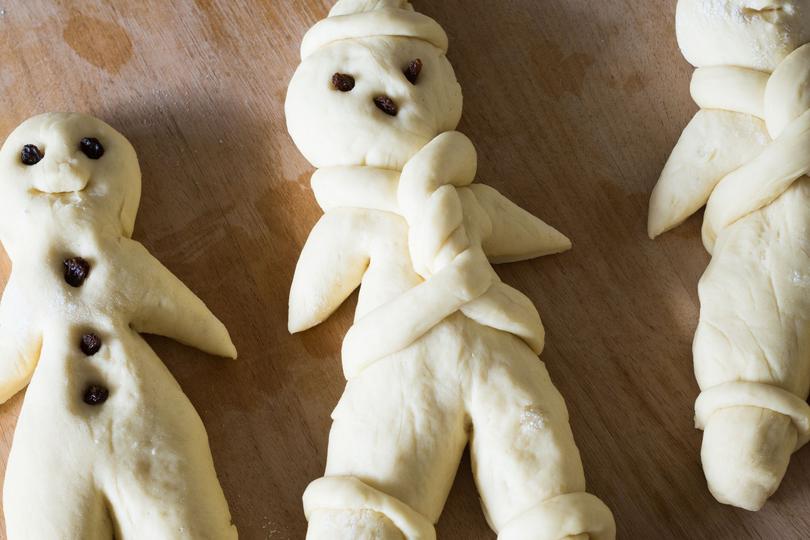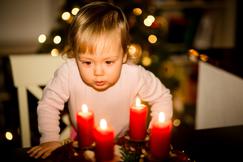Jack Frost and his assistants
Nicolaust traditions from all over the world
Santa Claus was real! According to history, St. Nicholas of Myra was a bishop who is said to have lived in the village of Myra - today it lies in the Turkish town of Demre - in the 4th century AD. According to the legend he shared his fortune with the poor: He put money coins into the shoes of destitute families.

On December 6, Santa Claus puts nuts, mandarins, sweets or small gifts into the boots of well-behaved children. This is the general Christian custom in Germany. There are various variations or local specialties. In Bremen, for example, there is a "Santa Claus run". Children dress up as Santa Claus and run around the city, singing and reciting poems. In other countries Santa Claus comes on other days or with his helpers. The Parents' Hotline has collected some interesting St. Nicholas customs from all over the world.
Austria: Attention of the "Krampus" goes around
In Austria, children also receive presents on St. Nicholas' Day, but here the focus is more on bringing up the children. Those who were not well-behaved are held accountable by the "Krampussen", the evil companions of Santa Claus, and are given a rod instead of sweets.
In some parts of Austria there are real Krampus parades, where people dressed up with bells and rods go through the streets to scare children.
Croatia: Celebrating twice is better
"Sveti Nicola" initiates the time of giving and giving gifts in Croatia. In Croatia "Sveti Nicola" is venerated as the patron saint of sailors and children. Sometimes he comes by boat or ship. Similarly as in Austria, in central Croatia there is a reward only for the good children, the others get rods put in their shoes on 6. 12. For the punishment is also here "Krampus" responsible, who accompanies "Sveti Nicola", if this is necessary.
In the southern and northeastern part of Croatia, "Santa Lucia" traditionally takes on the task of rewarding well-behaved children, but only on the 13th of December. In many regions of Croatia, both traditions merge into one. December is then something of a paradise for children, who now usually receive gifts on St. Nicholas Day and the Feast of Lucia.
Turkey: "Noel Baba" comes on New Year's Eve
In Turkey, too, St. Nicholas and Father Christmases now adorn the shops. The St. Nicholas tradition in Turkey is still relatively young and "Noel Baba" does not bring the presents on December 6th, but only on New Year's Eve. The fact that the historical St. Nicholas comes from the former Lycia and later became the bishop of Myra is not known in Turkey for long. In the 1950s, knowledge about the historical St. Nicholas and his birthplace spread in Turkey. Since then, the city of Demre (the former Myra) has developed into a real pilgrimage city.
Russia: Father Frost and his granddaughter
The veneration for St. Nicholas came from the Greek church via Russia to Europe, and yet on St. Nicholas Day the little ones are not given presents by our big neighbour in the east. Although St. Nicholas is the patron saint of Russia, traditionally "Ded Moroz" ("Little Father Frost") and his granddaughter "Snegurotschka" bring the presents on New Year's Day.
Romania: Of apple tree canes that hopefully will bloom
In Romania - as in Germany - children put boots on their doorstep and look forward to sweet presents from "Moş Nicolae". If the children have been naughty, they find an apple tree rod in their shoes, which is then placed in water and, when it starts to blossom by Christmas, shows that "Moş Nicolae" forgives the naughty children.
USA: Immigrant Santa Claus
In the United States, the white-bearded "Santa Claus" brings presents on Christmas Day and traditionally places them in front of the living room fireplace. Historically, the name "Santa Claus" has come a long way: it is related to the Dutch "Sinterklaas" and came to the USA via immigrants
"Giving": A custom of all religions
The idea of "giving" occurs in almost all religions and is not fixed to December. Muslims give each other presents on the Feast of Sacrifice and Eid. People of the Jewish faith give presents to poor people at Purim and at Hanukkah there is the tradition of "dreidel play". The winner receives sweets or small gifts. Hindus give each other presents at the festival of lights Divali, Holi or at the winter solstice "Makar Sankranti". Buddha's birthday provides an occasion for Buddhists to distribute gifts.
Conclusion: The idea of giving, of generosity and cohesion occurs in all religions. It doesn't matter whether Santa Claus comes on 6 December, only later or you don't celebrate him at all. In December, when the weather gets wet, cold and grey, it's good to be comfortable as a family. So that you can have a good time, here are a few tips to help you avoid family frustration. As parents and couple it is important to pull together. Patricia Cammarata's book tells you how to do this..
Published on
Topics
Articles on the topic
-
Glücksheldin with our founder Dieter Dohmen in the podcast
A conversation with lots of information about the ParentsHotline

-
3 options, many tips and an unforgettable birthday
(despite pandemic)

-
Websites for children? Here is a small selection
Why, why, why, if you don't ask... you don't get any smarter

-
A collection of the most beautiful Christmas movies
for the whole family

-
Winter time is Christmas time
Zweiklang Advent ideas for the 1st Advent

-
Shopping to the point of contemplation
How you can invest your time and money better than on Black Friday
